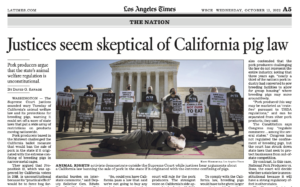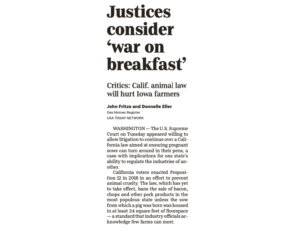Republican U.S. lawmakers plan to create a task force to study potential year-round sales of higher-ethanol E15 gasoline blends in the U.S., after an attempt to pass such legislation in…
U.S. Supreme Court Weighs Impacts of California Pork Welfare Law, While Pace of Corn, Soybean Exports Slows
David G. Savage reported in today’s Los Angeles Times that, “The Supreme Court justices sounded wary Tuesday of California’s animal welfare law and its protections for breeding pigs, warning it could set off a wave of state laws that put a wide array of restrictions on products moving nationwide.
“Pork producers based in the Midwest challenged the California ballot measure that would ban the sale of pork in the state if it originated with the extreme confining of breeding pigs in narrow metal cages.
“They argued that Proposition 12, which was approved by California voters in 2018, is unconstitutional because its ‘practical effect’ would be to force hog farmers across the nation to make costly changes in how they raise and confine their breeding pigs. They noted that more than 99% of the pork sold in California comes from other states.” (The case is National Pork Producers Council v. Ross).

Savage noted that, “The Biden administration joined the case on the side of the pork producers and stressed a similar argument. California’s Proposition 12 ‘imposes a substantial burden on interstate commerce,’ said Deputy Solicitor Gen. Edwin Kneedler. ‘It invites conflict and retaliation and threatens the balkanization of the national economic union.’
“California Solicitor Gen. Michael Mongan defended the law on the grounds that it applied only to pork sold in the state and not elsewhere.”
Today’s article indicated that,
The tenor of the two-hour argument suggested the court will rule for the pork producers.
“The strongest voice on California’s side appeared to be Justice Neil M. Gorsuch. He said the Constitution empowers Congress, not judges, to set national regulations that protect interstate commerce. He said it would be better to ‘defer to the states’ than to have judges decide which state laws have too much effect on businesses in other states.
“In 2018, 63% of California voters approved Proposition 12, which prohibited the sale of eggs or meat that originates from the extreme confinement of egg-laying hens, breeding pigs or calves raised for veal. The law was due to take full effect this year.”
Writing in today’s Washington Post, Robert Barnes reported that, “In the end, it appeared that some of the justices favored passing on the constitutionality issue for now and returning the case to California, where a judge might be forced to weigh the law’s burdens on interstate commerce against the moral and health benefits of the regulations California voters seek to impose.”

Adam Liptak reported in today’s New York Times that, “Timothy S. Bishop, a lawyer for the trade groups, said the law effectively imposed a nationwide regulation. ‘California wants to change farming methods everywhere,’ he said.
“Such extraterritorial requirements, he said, ran afoul of the Constitution’s commerce clause.
“Though the clause addresses congressional power, the Supreme Court has said that it also imposes some limits on state laws that affect conduct beyond the state’s borders. Those limits are said to arise from ‘the dormant commerce clause.’
“The justices explored how that interpretation applied to the California law with questions about actual and hypothetical laws.”
John Fritze and Donnelle Eller, writing on the front page of today’s Des Moines Register, reported that, “Several of the justices asked probing questions of both sides during more than two hours of argument that included more than two dozen references to Iowa. The underlying questions appeared to split traditional conservative and liberal alliances. But there seemed to be agreement among a majority of the court that the case could go back to a lower court for further review.”

And Reuters writer Nate Raymond reported yesterday that, “The justices appeared torn over whether the law went too far by forcing farmers in other states to change their practices in order to sell pork in the most populous U.S. state. Questions from some justices suggested that the court could allow a pork industry-backed lawsuit challenging the law to play out in the lower courts rather than rule on its constitutionality.”
Meanwhile, Reuters writer Karl Plume reported yesterday that, “U.S. crop exports at Louisiana Gulf Coast terminals were at their lowest level in nine years for the first week of October, a period when export shipments typically accelerate, according to U.S. Department of Agriculture (USDA) data issued on Tuesday.
“Low water on southern sections of the Mississippi River closed the major shipping waterway for days last week, halting the flow of grain barges from Midwest farms to the nation’s largest grain shipping port.
“The ill-timed shipping disruption comes as farmers are busy harvesting corn and soybeans, their top cash crops, leaving exporters scrambling for supplies at the start of the busiest period of the year for overseas U.S. crop shipments.”
Plume added that, “Two closed sections of the Mississippi River reopened over the weekend, allowing a backlog of stalled barges to begin moving again, but low water remains a concern for shippers amid a largely dry weather forecast.
“Shippers are loading less grain per barge to prevent the vessels from getting stuck in the drought-parched river and towboats are hauling fewer barges per tow to navigate the narrowed channel.”





